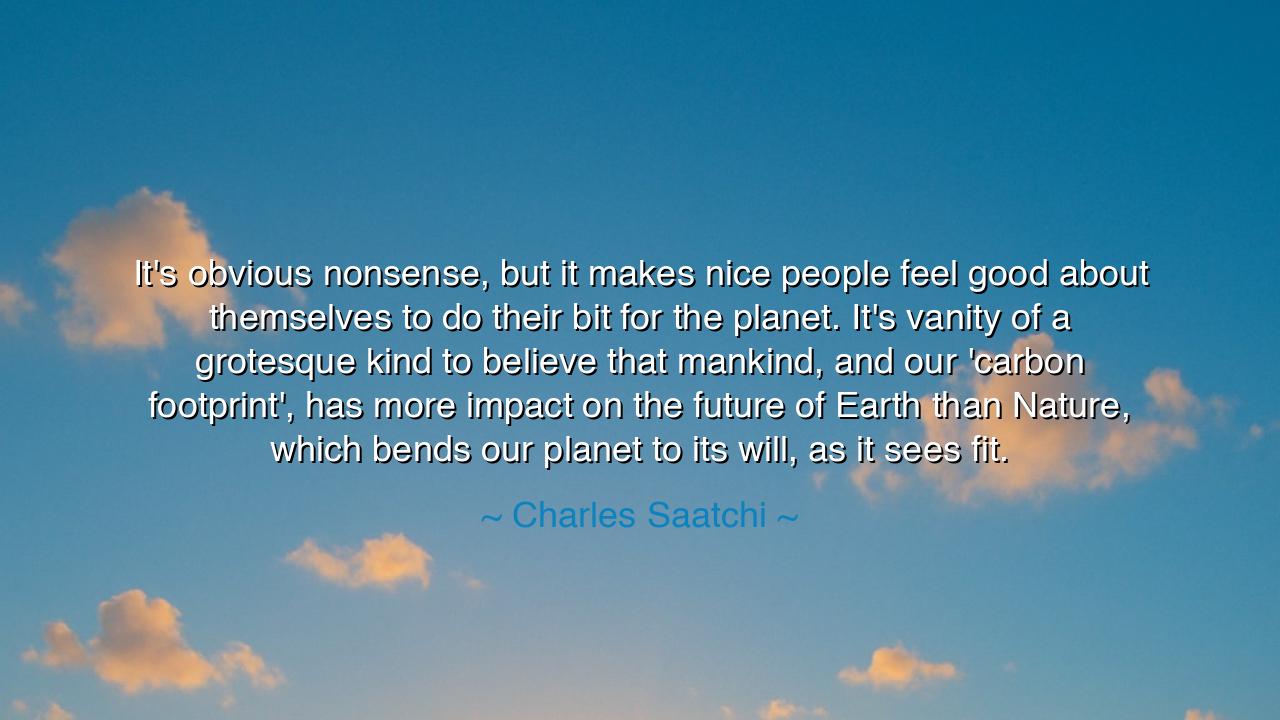
It's obvious nonsense, but it makes nice people feel good about
It's obvious nonsense, but it makes nice people feel good about themselves to do their bit for the planet. It's vanity of a grotesque kind to believe that mankind, and our 'carbon footprint', has more impact on the future of Earth than Nature, which bends our planet to its will, as it sees fit.






In the councils of old, elders warned that truth and pride often wrestle in the same cloak. Charles Saatchi’s provocation—“It’s obvious nonsense, but it makes nice people feel good about themselves to do their bit for the planet. It’s vanity of a grotesque kind to believe that mankind, and our ‘carbon footprint,’ has more impact on the future of Earth than Nature, which bends our planet to its will, as it sees fit.”—cuts with that double edge. On its surface, the line mocks performative virtue: the small rituals that soothe conscience more than they steady climate. Beneath, it advances a thunderous claim: that Nature—vast, ancient, implacable—dwarfs human consequence, and that to imagine otherwise is pride dressed as piety.
To hear the sentence rightly, attend to its speaker. Saatchi, famed for advertising and art, has long trafficked in the jab that startles people awake. The origin of the quote is that contrarian tradition: a quip meant to puncture fashionable certainty and expose our hunger to be seen as good. In that register, nonsense names what he takes to be hollow gestures; vanity names the desire to preen while the world burns or cools on scales far beyond our staging. He is not composing a paper for a journal; he is throwing a stone into the pond so we will watch the rings.
And it is true, as the elders would remind, that Nature keeps books in immensities. Consider the great eruption of Tambora in 1815: a mountain spoke once and the sky dimmed; harvests failed across oceans; “the year without a summer” entered memory like a bruise. One mountain, one season, millions of lives altered. In such spectacles, Saatchi’s scorn finds a foothold: compared to volcanoes, glaciers, currents, and the slow tilt of the planet, what is a shopping bag or a switch of bulbs? The earth has endured fire and ice long before we learned to say “we.”
Yet the tale is not finished there. History also records wounds writ plainly in human hands. The Aral Sea, once an inland ocean, was drunk away by policy and canal; ports now sit upon sand and salt storms scour the lungs of towns. The ozone layer thinned, then healed where we changed our chemistries; forests fell with chainsaw speed and were, in places, restored by covenant and care. These are not whispers beside mountains; they are proofs that mankind’s impact can be both grievous and reversible. If volcanoes teach humility, these histories teach accountability. The world is not clay under our total command—nor is it granite beyond our touch.
What, then, is the meaning of Saatchi’s barb? Read it as a warning against grotesque vanity and against despair alike. The vanity: to mistake tokenism for transformation, to treat morality as costume while emissions rise and habitats fall. The despair: to bow before Nature as if our choices were feathers in a hurricane, and so surrender the very agency that has already harmed—and can yet heal—our common home. The wise path walks between: let awe chasten arrogance, and let evidence chasten apathy.
Take a story as compass. A city once planned a billion-dollar filtration plant for its troubled river. Some called smaller acts “nonsense”—tree plantings, wetland mending, farm buffers. Yet engineers and citizens together chose the humbler road: restore the watershed. Years later, the water ran clear, energy bills fell, birds returned. No one act saved the river; the braid of many did. Here, “their bit” ceased to be performance and became practice—small deeds ordered toward a measurable good, neither preening nor pretending to outrank the monsoon.
From this, draw a clear lesson. Reject vanity; embrace vocation. Do not love symbolic gestures because they make nice people feel good; love effective habits because they make places better. Do not claim to outrule Nature; learn to work with her grain—protecting wetlands that blunt storms, forests that store carbon, soils that drink the rain. Ask of every choice: does it change the ledger of energy, land, and air in ways that can be counted, not merely announced?
Let counsel become action. Trade the selfie for the audit: know your household’s true carbon footprint and cut where it counts—heat, power, travel, food waste. Favor policies that move tons, not slogans: clean grids, efficient buildings, restored ecosystems, fair transitions for workers. Practice humility before Nature—prepare for floods and heat with trees, shade, and wiser streets—while refusing the lazy comfort of “it’s all nonsense.” In this way you honor the grain of Saatchi’s warning without swallowing its poison: you keep pride on a leash, keep awe in your step, and keep your hand to the work that measurably mends the future of Earth.






AAdministratorAdministrator
Welcome, honored guests. Please leave a comment, we will respond soon